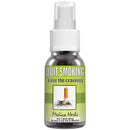Description
Quit Smoking Herbal Spray
Your Natural Path to Freedom
Key Benefits
-
Helps reduce cravings and supports smoking cessation
-
Strengthens the lungs and clears respiratory passages
-
Boosts circulation, metabolism, and energy levels
-
Reduces stress, irritability, and low mood linked to withdrawal
-
Detoxifies the liver and bloodstream
-
Supports nervous system balance and overall vitality
Product Overview
Quit Smoking Herbal Spray is a natural, fast-absorbing oral spray designed to support your journey to a smoke-free life. This unique formulation combines carefully selected herbs to reduce cravings, ease withdrawal symptoms, strengthen the respiratory system, and promote emotional balance.
Convenient and easy to use, this spray enters the bloodstream quickly through the soft tissues of the mouth, ensuring rapid effectiveness compared to tablets or capsules.
Key Herbal Ingredients & Their Benefits
-
Alfalfa (Medicago sativa) – Nutrient-rich tonic providing trace minerals and enzymes vital for energy and mental clarity【citation】.
-
Boneset (Eupatorium perfoliatum) – Relieves congestion, loosens phlegm, and provides anti-inflammatory support for the lungs【citation】.
-
Cayenne (Capsicum frutescens) – Stimulates circulation, strengthens immunity, and boosts metabolism【citation】.
-
Dandelion (Taraxacum officinale) – Cleanses the bloodstream and liver, improves bile production, and acts as a diuretic【citation】.
-
Ginkgo (Ginkgo biloba) – Enhances oxygen utilization, energy production, and supports mood balance【citation】.
-
Ginger (Zingiber officinale) – Improves circulation, stimulates energy, and supports cardiovascular health【citation】.
-
Hyssop (Hyssopus officinalis) – Assists in toxin elimination, supports respiratory health, and regulates blood pressure【citation】.
-
Horsetail (Equisetum arvense) – Rich in silica, supports bone, hair, skin, and nail health【citation】.
-
Kelp (Laminaria) – Nourishes the thyroid and adrenals, boosting metabolism and energy【citation】.
-
Calamus (Acorus calamus) – A digestive tonic for gastric issues such as indigestion and gastritis【citation】.
-
Kanna (Sceletium) – Reduces stress, anxiety, and irritability, easing withdrawal-related mood swings【citation】.
-
Milk Thistle (Silybum marianum) – Strengthens and detoxifies the liver, aiding toxin removal【citation】.
-
Peppermint (Mentha piperita) – Clears respiratory passages, eases congestion, and provides antibacterial support【citation】.
-
Skullcap (Scutellaria lateriflora) – Calms the nervous system, reduces restlessness, and promotes better sleep【citation】.
Usage & Dosage
-
Shake well before use.
-
Spray 2–3 squirts into the mouth, twice daily.
-
May be taken with fruit juice, herbal tea, or water.
Formulated for rapid absorption through the soft tissues of the mouth, ensuring fast and effective results.
Safety & Contraindications
-
Consult your healthcare provider if pregnant, breastfeeding, or being treated for a chronic illness.
-
Keep out of reach of children.
Formulation
Developed by a qualified, registered herbalist using premium herbal extracts, supported by traditional knowledge and scientific research.
📚 References
-
Goyal, A. et al. (2010). Medicinal plants: A potential source of compounds for drug development. Springer.
-
Foster, S., & Duke, J. A. (1990). A Field Guide to Medicinal Plants. Houghton Mifflin.
-
Srinivasan, K. (2016). Biological Activities of Red Pepper. Critical Reviews in Food Science & Nutrition, 56(9).
-
Ovadje, P. et al. (2011). Dandelion root extract in pancreatic cancer cells. Pancreas, 40(5).
-
Mix, J. A., & Crews, W. D. Jr. (2002). Efficacy of Ginkgo biloba extract EGb761. J Alt & Comp Med, 8(6).
-
Mashhadi, N. S. et al. (2013). Anti-inflammatory effects of ginger. Int J Preventive Medicine, 4(Suppl 1).
-
El-Sayed, A. M., & Mahgoub, S. A. (2011). Antioxidant activity of hyssop. World Appl Sci J, 12(10).
-
Salehi, B. et al. (2019). Therapeutic potential of horsetail. Advances in Food & Nutrition Research, 90.
-
Teas, J. et al. (2004). Iodine content in edible seaweeds. Thyroid, 14(10).
-
Khare, C. P. (2007). Indian Medicinal Plants: An Illustrated Dictionary. Springer.
-
Smith, M. T. et al. (1996). Psychoactive constituents of Sceletium. J Ethnopharmacol, 50(3).
-
Saller, R. et al. (2008). Systematic review of silymarin. Forsch Komplementmed, 15(1).
-
McKay, D. L., & Blumberg, J. B. (2006). Bioactivity of peppermint tea. Phytother Res, 20(8).
-
Awad, R. et al. (2003). Biological analysis of Skullcap. Phytomedicine, 10(8).


